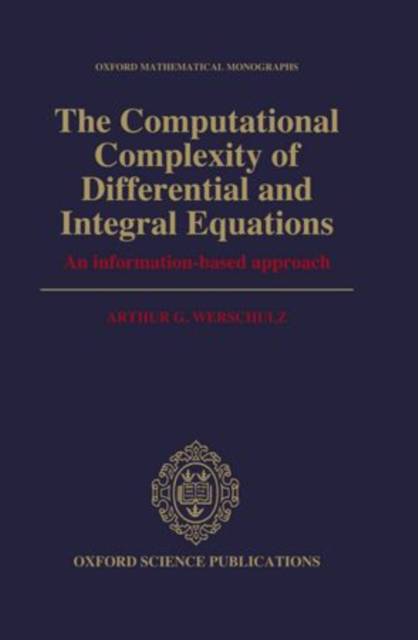
- Afhalen na 1 uur in een winkel met voorraad
- Gratis thuislevering in België vanaf € 30
- Ruim aanbod met 7 miljoen producten
- Afhalen na 1 uur in een winkel met voorraad
- Gratis thuislevering in België vanaf € 30
- Ruim aanbod met 7 miljoen producten
Zoeken
The Computational Complexity of Differential and Integral Equations
An Information-Based Approach
Arthur G Werschulz
€ 78,45
+ 156 punten
Omschrijving
Complexity theory has become an increasingly important theme in mathematical research. This book deals with an approximate solution of differential or integral equations by algorithms using incomplete information. This situation often arises for equations of the form Lu = f where f is some function defined on a domain and L is a differential operator. We do not have complete information about f. For instance, we might only know its value at a finite number of points in the domain, or the values of its inner products with a finite set of known functions. Consequently the best that can be hoped for is to solve the equation to within a given accuracy at minimal cost or complexity. In this book, the theory of the complexity of the solution to differential and integral equations is developed. The relationship between the worst case setting and other (sometimes more tractable) related settings, such as the average case, probabilistic, asymptotic, and randomized settings, is also
discussed. The author determines the inherent complexity of the problem and finds optimal algorithms (in the sense of having minimal cost). Furthermore, he studies to what extent standard algorithms (such as finite element methods for elliptic problems) are optimal. This approach is discussed in depth in the context of two-point boundary value problems, linear elliptic partial differential equations, integral equations, ordinary differential equations, and ill-posed problems. As a result, this volume should appeal to mathematicians and numerical analysts working on the approximate solution of differential and integral equations, as well as to complexity theorists addressing related questions in this area.
discussed. The author determines the inherent complexity of the problem and finds optimal algorithms (in the sense of having minimal cost). Furthermore, he studies to what extent standard algorithms (such as finite element methods for elliptic problems) are optimal. This approach is discussed in depth in the context of two-point boundary value problems, linear elliptic partial differential equations, integral equations, ordinary differential equations, and ill-posed problems. As a result, this volume should appeal to mathematicians and numerical analysts working on the approximate solution of differential and integral equations, as well as to complexity theorists addressing related questions in this area.
Specificaties
Betrokkenen
- Auteur(s):
- Uitgeverij:
Inhoud
- Aantal bladzijden:
- 344
- Taal:
- Engels
- Reeks:
Eigenschappen
- Productcode (EAN):
- 9780198535898
- Verschijningsdatum:
- 7/11/1991
- Uitvoering:
- Hardcover
- Formaat:
- Genaaid
- Afmetingen:
- 165 mm x 241 mm
- Gewicht:
- 704 g

Alleen bij Standaard Boekhandel
+ 156 punten op je klantenkaart van Standaard Boekhandel
Beoordelingen
We publiceren alleen reviews die voldoen aan de voorwaarden voor reviews. Bekijk onze voorwaarden voor reviews.











